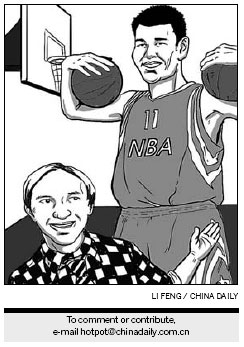Why Yao Ming serves as a very tall cross-cultural bridge
By Karl Arney (China Daily)
2011-03-01 16:05
 |
Large Medium Small |

When people talk about Yao Ming now, their thoughts are of his latest injury and the uncertainty this has brought upon his career.
When I heard that name recently though, my thoughts went elsewhere - to what a huge legacy he's created. It's a legacy that began with basketball but quickly took on a far more varied and vital life of its own.
When Yao was signed by the Houston Rockets in 2002, we Americans hadn't a clue what to make of him. A 2.26 meter tall Chinese player being selected No 1 in the NBA draft had previously seemed absurd, almost impossible.

This was an American populace, which didn't know the first thing about the Chinese language or contemporary culture and thought all Asians were small. The presence of a highly touted Chinese behemoth on NBA courts seemed like some bizarre novelty.
I'll never forget the 2003 Visa ad campaign that featured the skinny, awkward giant confusing sales clerks with his unfamiliar name. It's strange to remember how little the American public knew about Chinese people and names, but Yao seemed exotic and captured our attention before stepping foot on an NBA court.
Yet here we are nine years later, and none of that remains true. As we wait to see if Yao can recover from his stress fracture, his name rolls off American tongues as easily as that of any other American superstar. China, meanwhile, has emerged as a global giant, and the NBA is one of its favorite sporting franchises.
Our peoples may not yet have a perfect understanding of one another, but compared to where we were at the start of the last decade, our progress has been phenomenal. I won't attribute this solely to Yao's success as a cultural ambassador, but to the average Chinese or American sports fan, it's hard to overstate his influence.
That influence has proven so deep, however, that it's apparently easy to take for granted. Many young adults I speak to here seem oblivious to the fact that, pre-Yao, the NBA was barely a blip on China's radar.
In 2002, the NBA's domestic popularity was down and executives were praying that Yao's presence would attract Chinese audiences. To say that it did is putting it mildly. Suddenly, the NBA was all over Chinese TV, United States sports apparel stormed Chinese markets, and a new nation was learning the names of NBA superstars.
When I speak to my university students, the NBA inevitably comes up quickly.
The boys in particular relish the chance to discuss their favorite players, and it has proven a very useful means of bonding with them. Yet I consistently notice that the names that come up are Kobe Bryant and James LeBron and rarely Yao.
Chinese fans having a wide and unbiased variety of favorite players is great and heartening - a true tribute to the cross-cultural progress made between our countries in the past nine years.
What I find unfortunate, though, is that many are convinced that they like the NBA not because of their homeland's hero but rather because of Bryant and LeBron.
I realize that my students were 13 years old when Yao broke the nationality barrier.
So they may not fully appreciate what a seismic occurrence that was. But this is recent history, possibly the sole reason I can watch NBA games most mornings here - or why I can even write a column like this.
The peak of his career, and possibly that career itself, may be behind him, but Yao has already left an impact on international culture greater than most athletes dream of.
The next time we're enjoying our favorite players on CCTV 5, the sports channel, we might do well to stop and appreciate the one man who blazed the trail that led us all to that point.
| 分享按鈕 |